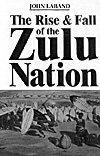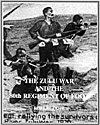For thirty years now, Donald R. Morris' 'The Washing of the Spears' has remained undoubtedly the most popular of all the many books written about the Zulu people. This is not surprising; it remains a powerful and eloquent read. After such a time, however, it must inevitably have become dated, if only because of the extraordinary amount of research it has stimulated.
 John Laband's 'The Rise and Fall of the Zulu Kingdom' (Arms and Armour Press, 125 Strand, London, WC211 OBB, price approx. 9 25.00) - previously available under its South African title, 'Rope of Sand' - has the temerity to take on 'Washing of the Spears' on its own ground.
John Laband's 'The Rise and Fall of the Zulu Kingdom' (Arms and Armour Press, 125 Strand, London, WC211 OBB, price approx. 9 25.00) - previously available under its South African title, 'Rope of Sand' - has the temerity to take on 'Washing of the Spears' on its own ground.
Professor Laband will, of course, be known to many readers through his pioneering study of the Zulu perspective of the events of 1879, and this is the culmination of his career. it is nothing less than a history of the old Zulu kingdom, from its foundation under Shaka in the 1820s, through the war of 1879, and its dissolution in the civil wars and rebellions of the 1880s.
And, far more than any other book, this story is told from the inside; it is a study of the events and people which drove the Zulu kingdom from the inside. As such, it's scholastic range is breathtaking, and it is written in a learned style which is never dull nor overblown. Professor Laband has always been interested in military matters, and this book includes the most concise and well researched accounts of the great battles, not only of 1879, but of early conflicts, such as Blood River or 'Ndondakusaka, currently available. It is also the first detailed study of the Zulu uprising against British rule in 1888 - the last time redcoat and Zulu met in battle.
Whether this book will ever quite displace 'The Washing of the Spears' in the public imagination is debatable, but it is undoubtedly the single most important book ever written on the Zulu kingdom.
 Robert Hope's 'The Zulu
War and the 80th Regiment of Foot'
(published by Churnet Valley Books, 43 Bath
Street, Leek, Staffs, ST13 6JQ, ISBN I897949-
24-3, price £ 12.95) is a detailed study of that
particular regiment's role in the Anglo-Zulu
War. The 80th, of course, played a
prominent part, being originally attached to
Col. Rowland's force on the Zulu/Transvaal
border, and later transferred to Col. Wood's
column. The northern sector was the most
volatile during the war, a war of raid and
counter-raid punctuated by three of the major
battles of the war Ntombe, Hlobane and Khambula.
Robert Hope's 'The Zulu
War and the 80th Regiment of Foot'
(published by Churnet Valley Books, 43 Bath
Street, Leek, Staffs, ST13 6JQ, ISBN I897949-
24-3, price £ 12.95) is a detailed study of that
particular regiment's role in the Anglo-Zulu
War. The 80th, of course, played a
prominent part, being originally attached to
Col. Rowland's force on the Zulu/Transvaal
border, and later transferred to Col. Wood's
column. The northern sector was the most
volatile during the war, a war of raid and
counter-raid punctuated by three of the major
battles of the war Ntombe, Hlobane and Khambula.
The 80th played its part in this, and in particularly suffered heavily when one of the great Zulu leaders of the war, Mbilim waMswati, successfully ambushed one of their convoys which had been stranded by bad weather at the Ntombe Drift. The 80th lost the best part of a company during the attack, and the senior officer, Captain Moriarty, was killed, while the senior NCO, Sergeant Booth, won the VC for rallying the survivors. This was the second VC won by the regiment during the campaign, incidentally; the only man to win the VC and survive at Isandlwana was a Private of the 80th, Samuel Wassall, who was attached to the Mounted Infantry.
Later, a patrol of the 80th was responsible for the death of Mbilini, who was killed in a skirmish, and the regiment was also present at Ulundi, the final action of the war. This book contains a wealth of information about the daily activities of the regiment, its engagements, its officers, and its men. It includes a detailed study of Ntombe, and lists of casualties, as well as a medal roll for the entire regiment.
No doubt there will be those who will find the odd flaw in some of these lists - no roll can ever be 100% perfect, since contemporary sources often disagree - but that should not detract from a very worthwhile look at one regiment's role in this perennially fascinating campaign.
With the centenary of the AngloBoer War approaching, there is bound to be increased interest in the subject, and this will surely be reflected in the publisher's lists.
'Clearly My Duty' is an eye-witness account of the war's later stages, taken from the letters of a young Scottish Yeomanry officer, Jack Gilmour (edited by Patrick Mileham, Tuckwell Press, East Linton, Scotland. ISBN 1-898410-34-8, price £ 15.99). This was the period when the grand campaigning of the early months had given way to a dogged and increasingly brutal guerrilla war, and Gilmour's description of it is fresh and honest. Much of the war consisted of ineffectual sweeps through the veld and inconclusive skirmishing, but Gilmour was present at the battle of Noitgedacht, when the Boers surprised a British camp in the Magaliesberg mountains in December 1900, and gives a telling account of it.
More Reviews
Back to Age of Empires Issue 14 Table of Contents
Back to Age of Empires List of Issues
Back to MagWeb Master List of Magazines
© Copyright 1998 by Partizan Press.
This article appears in MagWeb (Magazine Web) on the Internet World Wide Web.
Other military history articles and gaming articles are available at http://www.magweb.com